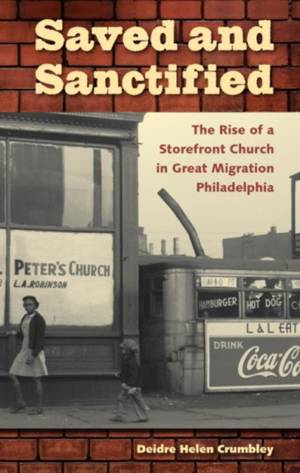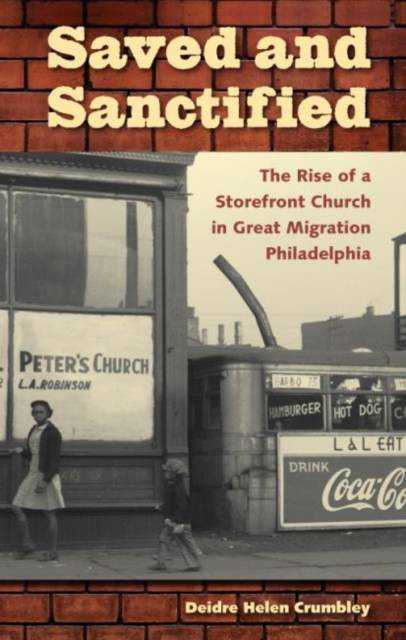
- Afhalen na 1 uur in een winkel met voorraad
- Gratis thuislevering in België vanaf € 30
- Ruim aanbod met 7 miljoen producten
- Afhalen na 1 uur in een winkel met voorraad
- Gratis thuislevering in België vanaf € 30
- Ruim aanbod met 7 miljoen producten
Zoeken
Saved and Sanctified
The Rise of a Storefront Church in Great Migration Philadelphia
Deidre Helen Crumbley
€ 104,95
+ 209 punten
Uitvoering
Omschrijving
During the early twentieth century, millions of southern blacks moved north to escape the violent racism of the Jim Crow South and to find employment in urban centers. They transplanted not only themselves but also their culture; in the midst of this tumultuous demographic transition emerged a new social institution, the storefront sanctified church.
Saved and Sanctified focuses on one such Philadelphia church that was started above a horse stable, was founded by a woman born sixteen years after the Emancipation Proclamation, and is still active today. "The Church," as it is known to its members, offers a unique perspective on an under-studied aspect of African American religious institutions.
Through painstaking historical and ethnographic research, Deidre Helen Crumbley illuminates the crucial role these oftentimes controversial churches played in the spiritual life of the African American community during and after the Great Migration. She provides a new perspective on women and their leadership roles, examines the loose or nonexistent relationship these Pentecostal churches have with existing denominations, and dispels common prejudices about those who attend storefront churches. Skillfully interweaving personal vignettes from her own experience as a member, along with life stories of founding members, Crumbley provides new insights into the importance of grassroots religion and community-based houses of worship.
Saved and Sanctified focuses on one such Philadelphia church that was started above a horse stable, was founded by a woman born sixteen years after the Emancipation Proclamation, and is still active today. "The Church," as it is known to its members, offers a unique perspective on an under-studied aspect of African American religious institutions.
Through painstaking historical and ethnographic research, Deidre Helen Crumbley illuminates the crucial role these oftentimes controversial churches played in the spiritual life of the African American community during and after the Great Migration. She provides a new perspective on women and their leadership roles, examines the loose or nonexistent relationship these Pentecostal churches have with existing denominations, and dispels common prejudices about those who attend storefront churches. Skillfully interweaving personal vignettes from her own experience as a member, along with life stories of founding members, Crumbley provides new insights into the importance of grassroots religion and community-based houses of worship.
Specificaties
Betrokkenen
- Auteur(s):
- Uitgeverij:
Inhoud
- Aantal bladzijden:
- 208
- Taal:
- Engels
- Reeks:
Eigenschappen
- Productcode (EAN):
- 9780813039848
- Verschijningsdatum:
- 22/04/2012
- Uitvoering:
- Hardcover
- Formaat:
- Genaaid
- Afmetingen:
- 155 mm x 231 mm
- Gewicht:
- 430 g

Alleen bij Standaard Boekhandel
+ 209 punten op je klantenkaart van Standaard Boekhandel
Beoordelingen
We publiceren alleen reviews die voldoen aan de voorwaarden voor reviews. Bekijk onze voorwaarden voor reviews.











